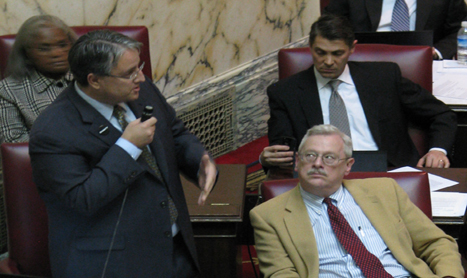In an historic 25-22 vote Thursday night, the Maryland Senate approved a highly controversial same-sex marriage bill, sending it to the desk of Gov. Martin O’Malley for his signature.
“It was a dream a long time coming,” said Sen. Richard Madaleno, D-Montgomery, a bill supporter and openly gay legislator.
As Senate bill supporters were joined in their celebration by allies from the House of Delegates, proponents said they were ready if need be to defend their victory at the ballot box in November.
“We’re going to celebrate today, but we’re going to be ready,” said Delegate Luke Clippinger, D-Baltimore, an openly gay lawmaker who was heavily involved in the bill’s successful push through the House. “I believe that we are going to be able to take this issue to the people of the state of Maryland where they’re going to vote ‘yes’ to support marriage equality.”
Bill opponents are expected to gather the 55,726 signatures needed to put the Civil Marriage Protection Act on the ballot. But some expressed concern Thursday about the referendum process.
“I would hope as well that as we leave here today with the outcome of this vote, that it does not renew the efforts to change the referendum process,” said Senate Minority Leader E.J. Pipkin, R-Cecil.
After passing in the Senate last year, this year’s legislation was projected to move quickly through the chamber. It narrowly passed in the House of Delegates Friday.
“Thanks to our elected leaders, clergy and faith-based leaders, community leaders, civic organizations, civil rights groups, and citizens from across our state, Maryland will now be able to protect individual civil marriage rights and religious freedom equally,” bill champion O’Malley said in a statement after the vote.
Thursday’s vote followed a long day of debate, with members considering a total of eight amendments. None were approved.
Discussion Thursday morning focused mainly on attempts to amend the language of the bill to protect public schools and religious institutions, motions that floor leader Sen. Jamie Raskin, D-Montgomery, referred to as “graffiti on the bill.”
Although the chamber considered just two amendments Thursday evening, members took more than two hours to explain their votes and make arguments.
Any amendment to HB 438 would have forced it back to the House, potentially killing it, as both chambers begin debate on O’Malley’s proposed budget in the coming weeks.
But bill opponents in the Senate vowed Thursday morning to keep pushing debate and amendments, despite firm resistance from bill supporters.
“It’s the Senate’s obligation to put together the best piece of legislation that protects religious freedom, deals with the education system,” Pipkin told reporters after the Thursday morning session.
There had been discussion throughout the week that bill opponents could invoke a filibuster, a delay tool not available in the House, but the measure’s chances waned throughout the day Thursday.
Senate President Thomas V. Mike Miller Jr., a bill opponent who worked to prevent a filibuster last year, said Thursday morning he was confident that he had the 29 votes needed for cloture, which cuts off debate.
The chamber did not move for cloture on Friday.
Miller ended up voting against the bill, but acknowledged its significance.
“I don’t think this is civil rights, but this is history,” Miller said after the vote. “Am I on the wrong side of history? There’s no doubt about it.”
The Senate Judicial Proceedings Committee advanced the legislation to the Senate floor on Tuesday, after the bill slid through the House with just a single vote to spare.
Six states — Massachusetts, Connecticut, Iowa, Vermont, New Hampshire and New York — and the District of Columbia, currently issue same-sex marriage licenses. A Washington state law passed earlier this month takes effect in June.
California’s Proposition 8 ban on same-sex marriage was recently held unconstitutional by a federal court, but an appeal is expected.
The same-sex marriage bill could reach O’Malley’s desk as early as Friday.

